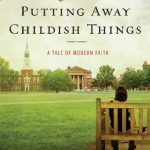Borg, Marcus. Putting Away Childish Things: A Tale of Modern Faith. HarperOne, 2010. ISBN: 9780061888144.
Meet the Author
 Marcus Borg is Canon Theologian at Trinity Episcopal Cathedral in Portland, Oregon. He is also professor emeritus in the philosophy department at Oregon State University, where he was the Hundere Chair in Religion until his retirement in 2007. Borg is among the most widely known and influential voices in progressive Christianity. He is best known for his work as a fellow in the Jesus Seminar, his biblical scholarship, and as the author of nineteen books. His most recent books are Putting Away Childish Things: A Tale of Modern Faith; Conversations with Scripture: Mark; and Jesus: Uncovering the Life, Teachings and Relevance of a Religious Revolutionary. For more information visit Borg’s website.
Marcus Borg is Canon Theologian at Trinity Episcopal Cathedral in Portland, Oregon. He is also professor emeritus in the philosophy department at Oregon State University, where he was the Hundere Chair in Religion until his retirement in 2007. Borg is among the most widely known and influential voices in progressive Christianity. He is best known for his work as a fellow in the Jesus Seminar, his biblical scholarship, and as the author of nineteen books. His most recent books are Putting Away Childish Things: A Tale of Modern Faith; Conversations with Scripture: Mark; and Jesus: Uncovering the Life, Teachings and Relevance of a Religious Revolutionary. For more information visit Borg’s website.
After years of writing books about various issues from a progressive Christian perspective, Borg moves into unfamiliar territory by writing a work of fiction: Putting Away Childish Things. Kate Riley, an assistant professor in the department of religious studies at a small Midwestern liberal arts college working toward tenure, becomes the voice of Borg as she encourages her students to reconsider their impressions of Christianity. Erin, one of Kate’s students, personifies the book’s title as she struggles to move from the childlike faith wherein everything is clear theologically toward something richer that she can claim as her own. As a number of situations help Kate become more aware that her scholarship is increasingly Christian, she struggles with whether or not she wishes to continue at this school or if she would prefer to teach at a seminary.
So What?
Kate Riley’s Religion and the Enlightenment course provides the outline for the explicit teachings within the book. Erin, a senior who has never before taken a class in the religious studies department, finds the class challenges many of her assumptions. Before taking the course, Erin was an active member of a conservative Christian student ministry group known as The Way and largely accepted their understandings as authoritative. As she works her way through the course, Erin becomes increasingly open to the more progressive views that are labeled as liberal and seen as unwelcome by those who have nurtured her.
Has your faith changed since childhood?
If so, what books, classes and/or people have influenced you to reconsider one or more aspects of your faith? How would you explain the change in your faith from young adulthood till now?
If your faith has remain largely unchanged since childhood, how has consideration of other perspectives helped strengthen your commitment to the faith of your youth?
